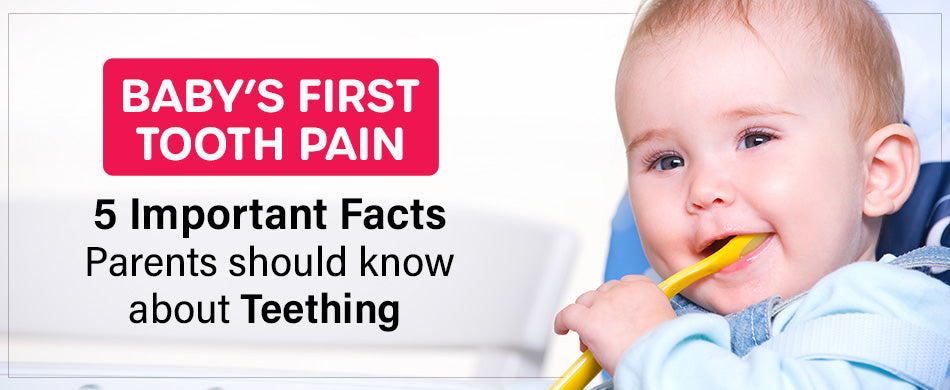
Baby’s First Tooth Pain: 5 Important Facts Parents Should Know about Teething
- by Baby Organo
- 2 min
Table of Contents
Teething is a natural process that occurs in every child during their early months of life, as their first set of teeth begin to emerge from the gums. While this is an important developmental milestone, it can also be an uncomfortable and painful experience for both the child and their parents.
In this blog, we will discuss some of the common teething issues in children and how parents can alleviate their child's discomfort.
The Teething Process
Typically, teething begins around 6 months of age, but it can start as early as 3 months or as late as 12 months. The first teeth to emerge are usually the bottom two front teeth, followed by the top two front teeth. The remaining teeth will then emerge over the next few years, typically completing the set by age 3.
Common Teething Issues
Teething can cause several issues for children, including:
- Pain and discomfort: As the teeth push through the gums, they can cause pain, discomfort, and irritation. This can lead to fussiness, crying, and difficulty sleeping.
- Drooling: Teething stimulates saliva production, which can cause excessive drooling. This can lead to skin irritation and rashes around the mouth and chin.
- Chewing and biting: Children often chew and bite on objects to relieve teething discomfort, which can lead to the destruction of toys, pacifiers, and other household items.
- Changes in appetite: Teething can cause decreased appetite, as it may be uncomfortable to eat and swallow.
- Fever: Some children may develop a low-grade fever during teething, but if the fever is high or accompanied by other symptoms, it may be a sign of an infection and should be evaluated by a doctor.
Alleviating Teething Discomfort
Although teething can be a challenging time for both children and parents, there are several ways to alleviate the discomfort and make the process easier:
- Offer something cold to chew on: Cold temperatures can numb the gums and alleviate pain. You can offer your child a chilled teething ring or a cold washcloth to chew on.
- Use over-the-counter medication: Acetaminophen or ibuprofen can be used to alleviate pain and reduce fever. However, always consult with your pediatrician before giving any medication to your child.
- Massage the gums: Gently massaging the gums with a clean finger or a teething toy can help alleviate discomfort.
- Offer soft foods: If your child is having difficulty eating, offer soft foods that are easy to swallow, such as pureed fruits and vegetables or oatmeal.
- Practice good oral hygiene: Once teeth start to emerge, it's important to start practicing good oral hygiene. Use a soft-bristled toothbrush and fluoride free toothpaste to gently clean your child's teeth twice a day.
Home Remedy for Teething Discomfort
Although teething can be a challenging time for both children and parents, there are several ways to alleviate the discomfort and make the process easier:
- Ginger root: Ginger root has natural anti-inflammatory properties and can help reduce teething pain. You can make a ginger root tea by boiling a small piece of ginger in water, letting it cool, and then using a clean cloth to apply it to your baby's gums.
- Clove oil: Clove oil has natural numbing properties and can help alleviate teething pain. However, it should be used with caution, as it can be toxic in large doses. You can dilute a small amount of clove oil in a carrier oil, such as coconut oil, and apply it to your baby's gums.
- Chamomile tea: Chamomile tea has natural calming properties and can help soothe a fussy teething baby. You can brew a cup of chamomile tea, let it cool, and offer it to your baby in a bottle or sippy cup.
- Breast milk or formula popsicles: You can make popsicles out of breast milk or formula by pouring it into a popsicle mold and freezing it. The cold temperature can help alleviate teething pain, while also providing a nutritious and comforting treat.
- Bannana: It is soft and soothing for babies. Biting on banana soothes the gums and help to relive pain in kids.
Conclusion
Teething is a natural process that every child goes through, but it can be a painful and uncomfortable experience. As a parent, it's important to be aware of the common teething issues and know how to alleviate your child's discomfort.
By offering cold objects to chew on, using medication if necessary, massaging the gums, offering soft foods, and practicing good oral hygiene, you can help make the teething process easier for both you and your child.
Once babies develop their first tooth it’s important to start brushing. It will help to keep their teeth healthy free from cavit. If brushing is not done regularly babies teeth may get black stains due to cavities. You can use BabyOrgano Ayurvedic Kids toothpaste as your child’s first toothpaste as it’s completely safe and natural.
- Tags:
- Parenting tips

